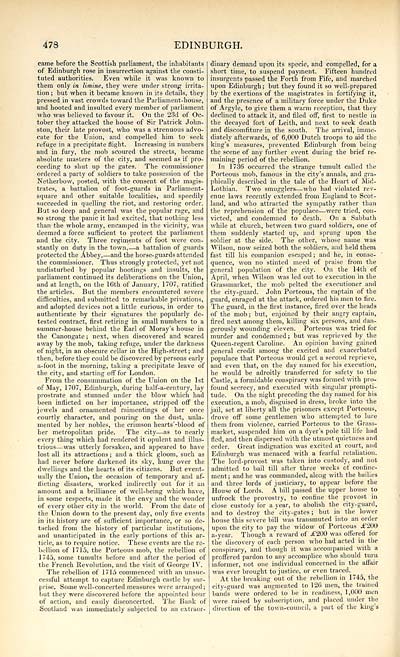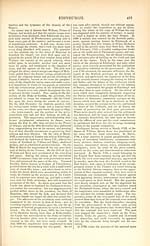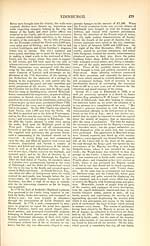Topographical, statistical, and historical gazetteer of Scotland > Volume 1
(570) Page 478
Download files
Complete book:
Individual page:
Thumbnail gallery: Grid view | List view

478
EDINBURGH.
came before the Scottish parliament, the inhabitants
of Edinburgh rose in insurrection against the consti-
tuted authorities. Even while it was known to
them only in limine, they were under str^on^r irrita-
tion ; but when it became known in its details, they
pressed in vast crowds toward the Parliament-house,
and hooted and insulted every member of parliament
who was believed to favour it. On the 23d of Oc-
tober they attacked the house of Sir Patrick John-
ston, their late provost, who was a strenuous advo-
cate for the Union, and compelled him to seek
refuge in a precipitate flight. Increasing in numbers
and in fury, the mob scoured the streets, became
absolute masters of the city, and seemed as if pro-
ceeding to shut up the gates. The commissioner
ordered a party of soldiers to take possession of the
Netherbow, posted, with the consent of the magis-
trates, a battalion of foot-guards in Parliament-
square and other suitable localities, and speedily
succeeded in quelling the riot, and restoring order.
But so deep and general was the popular rage, and
so strong the panic it had excited, that nothing less
than the whole army, encamped in the vicinity, was
deemed a force sufficient to protect the parliament
and the city. Three regiments of foot were con-
stantly on duty in the town, — a battalion of guards
protected the Abbey,— and the horse- guards attended
the commissioner. Thus strongly protected, yet not
undisturbed by popular hootings and insults, the
parliament continued its deliberations on the Union,
and at length, on the 16th of January, 1707, ratified
the articles. But the members encountered severe
difficulties, and submitted to remarkable privations,
and adopted devices not a little curious, in order to
authenticate by their signatures the popularly de-
tested contract, first retiring in small numbers to a
summer-house behind the Earl of Moray's house in
the Canongate ; next, when discovered and scared
away by the mob, taking refuge, under the darkness
of night, in an obscure cellar in the High-street ; and
then, before they could be discovered by persons early
a-foot in the morning, taking a precipitate leave of
the city, and starting off for London.
From the consummation of the Union on the 1st
of May, 1707, Edinburgh, during half-a-century, lay
prostrate and stunned under the blow which had
been inflicted on her importance, stripped off the
jewels and ornamented raimentings of her once
courtly character, and pouring on the dust, unla-
inented by her nobles, the crimson hearts'-blood of
her metropolitan pride. The city — as to nearly
every thing which had rendered it opulent and illus-
trious — was utterly forsaken, and appeared to have
lost all its attractions ; and a thick gloom, such as
had never before darkened its sky, hung over the
dwellings and the hearts of its citizens. But event-
ually the Union, the occasion of temporary and af-
flicting disasters, worked indirectly out for it an
amount and a brilliance of well-being which have,
in some respects, made it the envy and the wonder
of every other city in the world. From the date of
the Union down to the present day, only five events
in its history are of sufficient importance, or so de-
tached from the history of particular institutions,
and unanticipated in the early portions of this ar-
ticle, as to require notice. These events are the re-
bellion of 1715, the Porteous mob, the rebellion of
] 745, some tumults before and after the period of
the French Revolution, and the visit of George IV.
The rebellion of 1715 commenced with an unsuc-
cessful attempt to capture Edinburgh castle by sur-
prise. Some well-concerted measures were arranged ;
but they were discovered before the appointed hour
of action, and easily disconcerted. The Bank of
Scotland was immediately subjected to an extraor-
dinary demand upon its specie, and compelled, for a
short time, to suspend payment. Fifteen hundred
insurgents passed the Forth from Fife, and marched
upon Edinburgh ; but they found it so well-prepared
by the exertions of the magistrates in fortifying it,
and the presence of a military force under the Duke
of Argyle, to give them a warm reception, that they
declined to attack it, and filed off, first to nestle in
the decayed fort of Leith, and next to seek death
and discomfiture in the south. The arrival, imme-
diately afterwards, of 6,000 Dutch troops to aid the
king's measures, prevented Edinburgh from being
the scene of any further event during the brief re-
maining period of the rebellion.
In 1736 occurred the strange tumult called the
Porteous mob, famous in the city's annals, and gra-
phically described in the tale of the Heart of Mid-
Lothian. Two smugglers — who had violated rev-
enue laws recently extended from England to Scot-
land, and who attracted the sympathy rather than
the reprehension of the populace — were tried, con-
victed, and condemned to death. On a Sabbath
while at church, between two guard soldiers, one of
them suddenly started up, and sprung upon the
soldier at the side. The other, whose name was
Wilson, now seized both the soldiers, and held them
fast till his companion escaped ; and he, in conse-
quence, won no stinted meed of praise from the
general population of the city. On the 14th of
April, when Wilson was led out to execution in the
Grassmarket, the mob pelted the executioner and
the city-guard. John Porteous, the captain of the
guard, enraged at the attack, ordered his men to tire.
The guard, in the first instance, fired over the heads
of the mob ; but, enjoined by their angry captain,
fired next among them, killing six persons, and dan-
gerously wounding eleven. Porteous was tried for
murder and condemned ; but was reprieved by the
Queen-regent Caroline. An opinion having gained
general credit among the excited and exacerbated
populace that Porteous would get a second reprieve,
and even that, on the day named for his execution,
he would be adroitly transferred for safety to the
Castle, a formidable conspiracy was formed with pro-
found secrecy, and executed with singular prompti-
tude. On the night preceding the day named for his
execution, a mob, disguised in dress, broke into the
jail, set at liberty all the prisoners except Porteous,
drove off some gentlemen who attempted to lure
them from violence, carried Porteous to the Grass-
market, suspended him on a dyer's pole till life had
fled, and then dispersed with the utmost quietness and
order. Great indignation was excited at court, and
Edinburgh was menaced with a fearful retaliation.
The lord-provost was taken into custody, and not
admitted to bail till after three weeks of confine-
ment; and he was commanded, along with the bailies
and three lords of justiciary, to appear before the
House of Lords. A bill passed the upper house to
unfrock the provostry, to confine the provost in
close custody for a year, to abolish the city-guard,
and to destroy the" city-gates ; but in the lower
house this severe bill was transmuted into an order
upon the city to pay the widow of Porteous i'200
a-year. Though a reward of £200 was offered for
the discovery of each person who had acted in the
conspiracy, and though it was accompanied with a
proffered pardon to any accomplice who should turn
informer, not one individual concerned in the affair
was ever brought to justice, or even traced.
At the breaking out of the rebellion in 1745, the
city-guard was augmented to 126 men, the trained
bands were ordered to be in readiness, 1,000 men
were raised by subscription, and placed under the
direction of the town-council, a part of the king's
EDINBURGH.
came before the Scottish parliament, the inhabitants
of Edinburgh rose in insurrection against the consti-
tuted authorities. Even while it was known to
them only in limine, they were under str^on^r irrita-
tion ; but when it became known in its details, they
pressed in vast crowds toward the Parliament-house,
and hooted and insulted every member of parliament
who was believed to favour it. On the 23d of Oc-
tober they attacked the house of Sir Patrick John-
ston, their late provost, who was a strenuous advo-
cate for the Union, and compelled him to seek
refuge in a precipitate flight. Increasing in numbers
and in fury, the mob scoured the streets, became
absolute masters of the city, and seemed as if pro-
ceeding to shut up the gates. The commissioner
ordered a party of soldiers to take possession of the
Netherbow, posted, with the consent of the magis-
trates, a battalion of foot-guards in Parliament-
square and other suitable localities, and speedily
succeeded in quelling the riot, and restoring order.
But so deep and general was the popular rage, and
so strong the panic it had excited, that nothing less
than the whole army, encamped in the vicinity, was
deemed a force sufficient to protect the parliament
and the city. Three regiments of foot were con-
stantly on duty in the town, — a battalion of guards
protected the Abbey,— and the horse- guards attended
the commissioner. Thus strongly protected, yet not
undisturbed by popular hootings and insults, the
parliament continued its deliberations on the Union,
and at length, on the 16th of January, 1707, ratified
the articles. But the members encountered severe
difficulties, and submitted to remarkable privations,
and adopted devices not a little curious, in order to
authenticate by their signatures the popularly de-
tested contract, first retiring in small numbers to a
summer-house behind the Earl of Moray's house in
the Canongate ; next, when discovered and scared
away by the mob, taking refuge, under the darkness
of night, in an obscure cellar in the High-street ; and
then, before they could be discovered by persons early
a-foot in the morning, taking a precipitate leave of
the city, and starting off for London.
From the consummation of the Union on the 1st
of May, 1707, Edinburgh, during half-a-century, lay
prostrate and stunned under the blow which had
been inflicted on her importance, stripped off the
jewels and ornamented raimentings of her once
courtly character, and pouring on the dust, unla-
inented by her nobles, the crimson hearts'-blood of
her metropolitan pride. The city — as to nearly
every thing which had rendered it opulent and illus-
trious — was utterly forsaken, and appeared to have
lost all its attractions ; and a thick gloom, such as
had never before darkened its sky, hung over the
dwellings and the hearts of its citizens. But event-
ually the Union, the occasion of temporary and af-
flicting disasters, worked indirectly out for it an
amount and a brilliance of well-being which have,
in some respects, made it the envy and the wonder
of every other city in the world. From the date of
the Union down to the present day, only five events
in its history are of sufficient importance, or so de-
tached from the history of particular institutions,
and unanticipated in the early portions of this ar-
ticle, as to require notice. These events are the re-
bellion of 1715, the Porteous mob, the rebellion of
] 745, some tumults before and after the period of
the French Revolution, and the visit of George IV.
The rebellion of 1715 commenced with an unsuc-
cessful attempt to capture Edinburgh castle by sur-
prise. Some well-concerted measures were arranged ;
but they were discovered before the appointed hour
of action, and easily disconcerted. The Bank of
Scotland was immediately subjected to an extraor-
dinary demand upon its specie, and compelled, for a
short time, to suspend payment. Fifteen hundred
insurgents passed the Forth from Fife, and marched
upon Edinburgh ; but they found it so well-prepared
by the exertions of the magistrates in fortifying it,
and the presence of a military force under the Duke
of Argyle, to give them a warm reception, that they
declined to attack it, and filed off, first to nestle in
the decayed fort of Leith, and next to seek death
and discomfiture in the south. The arrival, imme-
diately afterwards, of 6,000 Dutch troops to aid the
king's measures, prevented Edinburgh from being
the scene of any further event during the brief re-
maining period of the rebellion.
In 1736 occurred the strange tumult called the
Porteous mob, famous in the city's annals, and gra-
phically described in the tale of the Heart of Mid-
Lothian. Two smugglers — who had violated rev-
enue laws recently extended from England to Scot-
land, and who attracted the sympathy rather than
the reprehension of the populace — were tried, con-
victed, and condemned to death. On a Sabbath
while at church, between two guard soldiers, one of
them suddenly started up, and sprung upon the
soldier at the side. The other, whose name was
Wilson, now seized both the soldiers, and held them
fast till his companion escaped ; and he, in conse-
quence, won no stinted meed of praise from the
general population of the city. On the 14th of
April, when Wilson was led out to execution in the
Grassmarket, the mob pelted the executioner and
the city-guard. John Porteous, the captain of the
guard, enraged at the attack, ordered his men to tire.
The guard, in the first instance, fired over the heads
of the mob ; but, enjoined by their angry captain,
fired next among them, killing six persons, and dan-
gerously wounding eleven. Porteous was tried for
murder and condemned ; but was reprieved by the
Queen-regent Caroline. An opinion having gained
general credit among the excited and exacerbated
populace that Porteous would get a second reprieve,
and even that, on the day named for his execution,
he would be adroitly transferred for safety to the
Castle, a formidable conspiracy was formed with pro-
found secrecy, and executed with singular prompti-
tude. On the night preceding the day named for his
execution, a mob, disguised in dress, broke into the
jail, set at liberty all the prisoners except Porteous,
drove off some gentlemen who attempted to lure
them from violence, carried Porteous to the Grass-
market, suspended him on a dyer's pole till life had
fled, and then dispersed with the utmost quietness and
order. Great indignation was excited at court, and
Edinburgh was menaced with a fearful retaliation.
The lord-provost was taken into custody, and not
admitted to bail till after three weeks of confine-
ment; and he was commanded, along with the bailies
and three lords of justiciary, to appear before the
House of Lords. A bill passed the upper house to
unfrock the provostry, to confine the provost in
close custody for a year, to abolish the city-guard,
and to destroy the" city-gates ; but in the lower
house this severe bill was transmuted into an order
upon the city to pay the widow of Porteous i'200
a-year. Though a reward of £200 was offered for
the discovery of each person who had acted in the
conspiracy, and though it was accompanied with a
proffered pardon to any accomplice who should turn
informer, not one individual concerned in the affair
was ever brought to justice, or even traced.
At the breaking out of the rebellion in 1745, the
city-guard was augmented to 126 men, the trained
bands were ordered to be in readiness, 1,000 men
were raised by subscription, and placed under the
direction of the town-council, a part of the king's
Set display mode to: Large image | Transcription
Images and transcriptions on this page, including medium image downloads, may be used under the Creative Commons Attribution 4.0 International Licence unless otherwise stated. ![]()
| Gazetteers of Scotland, 1803-1901 > Topographical, statistical, and historical gazetteer of Scotland > Volume 1 > (570) Page 478 |
|---|
| Permanent URL | https://digital.nls.uk/97444386 |
|---|
| Description | Volume first. A-H. |
|---|---|
| Attribution and copyright: |
|

